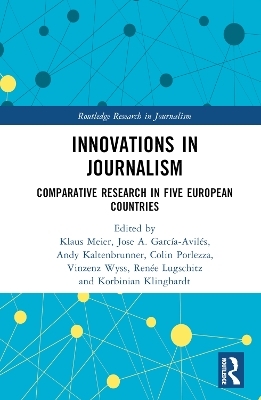
Innovations in Journalism
Routledge (Verlag)
978-1-032-63039-7 (ISBN)
Drawing on an international research project conducted in Germany, Austria, Switzerland, Spain, and the United Kingdom, the book takes a complex approach, considering media policy preconditions and the social impact of journalistic innovation from a comparative perspective. The key findings are examined and presented on different levels: theoretical, methodological, and – as the focus – empirical.
Having identified the most relevant innovations in each of the five countries, a total of 100 case studies are examined to explore the influence of these innovations on the quality of journalism and its normative role in democratic societies and to analyze which preconditions support or inhibit the development and implementation of the innovations in news organizations. The interdependencies between journalistic innovations and their media policy preconditions are compared in a system-analytical way – concluding with the lessons that can be learned from the macrolevel (policies) and the mesolevel (organizations).
This insightful and truly international volume will interest professionals, scholars and students of journalism, media and communication studies, media industry studies, and related fields.
The Open Access version of this book, available at http://www.taylorfrancis.com, has been made available under a Creative Commons Attribution-Non Commercial-No Derivatives (CC-BY-NC-ND) 4.0 license.
Klaus Meier, Prof. Dr., holds the Chair for Journalism Studies with a focus on Innovation and Transformation at the Catholic University Eichstaett-Ingolstadt (Germany). His research explores ethics and quality of journalism, transfer between science and practice, convergence, digital journalism, and journalism education. José A. García-Avilés, PhD, is Full Professor of Journalism at Miguel Hernández University (Spain), where he lectures in the master’s program in Journalism Innovation. He was a visiting scholar at the Media Studies Center based at Columbia University (New York). His main research interests are digital journalism, news quality, and media innovation. Andy Kaltenbrunner, Dr., is Managing Partner of Medienhaus Wien and Honorary Professor at the Miguel Hernández University, Elche. He led the development of several academic and executive programs on journalism, media management, and production. His main research areas are media policy, innovation, and transformation in journalism. He leads programs on these topics at the Austrian Academy of Sciences. Colin Porlezza, PhD, is Senior Assistant Professor of Digital Journalism with the Institute of Media and Journalism at the Università della Svizzera italiana. He studied communication science and holds a PhD in journalism studies. His research focuses on automated journalism and AI, the innovation and datafication of digital journalism, and journalism ethics and accountability. Vinzenz Wyss, PhD, Professor for Journalism at the Zurich University of Applied Sciences in Winterthur. His main focus is on quality and quality assurance in journalism, media ethics and media criticism. With his company “Media Quality Assessment”, he evaluates the quality assurance systems of media organizations. Renée Lugschitz, PhD, is a Researcher at Medienhaus Wien and the Austrian Academy of Sciences/University of Klagenfurt. She studied history and holds a PhD in journalism studies. Her main focuses are practice-oriented research on transition in journalism, on changes in the journalistic profession, and on journalism quality from a historical and gender perspective. Korbinian Klinghardt, MA, PhD candidate, is a Research Associate at the Chair for Journalism Studies with a focus on Innovation and Transformation at the Catholic University of Eichstätt-Ingolstadt. He studied media studies at the University of Regensburg and at the Università degli studi Roma Tre. His research focuses on innovations and quality in journalism as well as journalism on social media.
Introduction
Part I. Theoretical Framework
1 Innovations in Journalism in Democratic Societies: theoretical concepts, definitions, and preconditions
Part II. Methodological approach
2 Research methods in the JoIn-DemoS project
Part III. National Framework Conditions for Innovation in Journalism
3 Country Report Austria. Difficult departure from the comfort zone
4 Country Report Germany. The Media System as a Brake on Journalistic Innovation Development
5 Country Report Spain. Surfing the waves of crises. Spain’s framework conditions for innovations in journalism
6 Country report Switzerland. Caught between financial pressure, audience expectations and political ideology
7 Country Report UK. Dead end street? UK’s framework conditions for innovations in journalism
Part IV. The most relevant innovations in journalism from a comparative perspective
8 AI and automation: A key task for the present and future
9 Collaborative-investigative journalism. From the ‘Lonely Wolf’ to the ‘Power of the Pack’
10 Data journalism. From a niche competence to a key feature
11 Diversity and inclusion. “Difference matters”
12 Engagement on the basis of data. Tracing users’ behavior to optimize journalistic offers
13 New organizational forms and teams. Changing minds to modify the newsroom
14 Paywalls and paid content. No entry for free: the introduction of paywall-models to monetize online journalism
15 News on Social Media. An innovation dilemma in the race of uncertainty
16 Podcasts. Provider of in-depth journalistic information
17 Citizen participation. On the way from the audience to the community in European news media
18 Mobile/live journalism: The impact of the small screen and breaking news on media organization and production
19 New digital storytelling. Innovative narratives that make a difference
20 Remote media work: tools and management. Hybrid formulas for journalistic daily routines
21 Donations and Crowdfunding. New strategies for financing (investigative) journalism
22 Fact-checking. Strengthening democracy through verifying
23 Media Labs. Agents of innovation
24 Membership models. Quality journalism? Pay up, please
25 Newsletters. The renaissance of a valuable product to reach the audience
Part V. Journalistic innovations and their socio-political framework conditions. A 5-country comparison
26 Media systems on the meta level of change. How economy, tech-development and media-policy create the framework for innovation in journalism
Part VI. Conclusions and Recommendations
27 Lessons from the implementation of the most relevant journalism innovations in five European countries
28 Opportunities and challenges of innovations for media practice
29 Deepening the theory of innovation in journalism: Impact on the industry, the quality and the function of journalism in democracy
| Erscheinungsdatum | 27.04.2024 |
|---|---|
| Reihe/Serie | Routledge Research in Journalism |
| Zusatzinfo | 6 Tables, black and white; 2 Line drawings, black and white; 1 Halftones, black and white; 3 Illustrations, black and white |
| Verlagsort | London |
| Sprache | englisch |
| Maße | 156 x 234 mm |
| Gewicht | 762 g |
| Themenwelt | Kunst / Musik / Theater |
| Informatik ► Grafik / Design ► Film- / Video-Bearbeitung | |
| Sozialwissenschaften ► Kommunikation / Medien ► Journalistik | |
| Sozialwissenschaften ► Kommunikation / Medien ► Medienwissenschaft | |
| ISBN-10 | 1-032-63039-6 / 1032630396 |
| ISBN-13 | 978-1-032-63039-7 / 9781032630397 |
| Zustand | Neuware |
| Haben Sie eine Frage zum Produkt? |
aus dem Bereich


